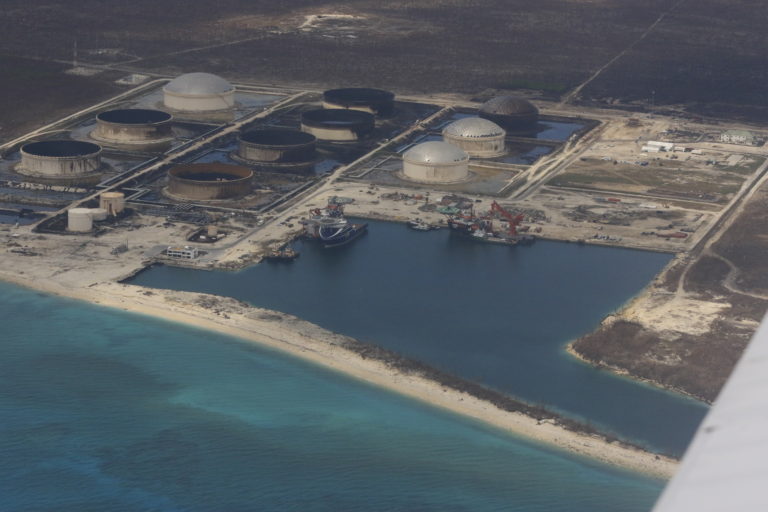Coalition Doubles Down on Call for Oil Drilling Ban Following Recent UN Climate Report
By: Waterkeeper Alliance

IPCC Scientists declare: We can halve emissions by 2030.
Today, the Our Islands Our Future coalition is reaffirming its position with regard to a permanent nationwide ban on oil drilling in The Bahamas, following the most recent United Nations Intergovernmental Panel on Climate Change (IPCC) report, which was published on 4 April 2022. This report called for major transitions in the energy sector – a substantial reduction in fossil fuels use, improved energy efficiency, and use of alternative fuels in order to limit global warming. The coalition is convinced any offshore drilling approvals will no doubt compromise the future well-being of The Bahamas.
The IPCC Working Group 3 Report, Climate Change 2022: Mitigation of Climate Change, provides an updated global assessment of climate change mitigation progress and pledges, and examines the sources of global emissions. It also explains developments in emission reduction and mitigation efforts, assessing the impact of national climate pledges in relation to long-term emission goals. “Investing in new fossil fuels infrastructure is moral and economic madness,” stated UN Secretary-General Antonio Guterres.
The group echoes the UN report, stating that the evidence is clear and the time for action is now. Without immediate and deep emissions reductions across all sectors, limiting global warming to 1.5°C is beyond reach.
“The reality is that greenhouse gas emissions, which are causing global warming, are at their highest levels in human history,” said IPCC Working Group III Co-Chair Jim Skea. “It’s now or never, if we want to limit global warming to 1.5˚C (2.7˚F). Without immediate and deep emissions reductions across all sectors, it will be impossible.”
“We are at a crossroads. The decisions we make now can secure a liveable future. We have the tools and know-how required to limit warming,” said IPCC Chair Hoesung Lee. “I am encouraged by climate action being taken in many countries. There are policies, regulations and market instruments that are proving effective. If these are scaled up and applied more widely and equitably, they can support deep emissions reductions and stimulate innovation.”
Based on the findings of the IPCC, the coalition believes no new investments in fossil fuels are possible if we are to keep temperatures to 1.5˚C. However, we are incredibly fortunate in The Bahamas to have an abundant potential for renewables to replace the carbon-intensive energy of fossil fuels.
“The newest IPCC report released today confirms that developing an energy system based on renewable energy and storage is the best way to ensure long-term energy security,” said coalition member Casuarina McKinney-Lambert, of BREEF, “but annual solar and wind investments must more than double in 2023-2032 compared with 2021 to keep below 1.5˚C within reach.”
“The report also emphasized the importance of reducing our global demand for energy. Energy efficiency is something that children are learning in school and taking home to their families. It has immediate cost savings, as well as important implications for a sustainable future.”
“The report also highlighted that “coordinated cross-sectoral policies and planning must be the focus to support the linkages between mitigation”, said coalition member Rashema Ingraham of Waterkeepers Bahamas, “which means that all stakeholders must be able to access and provide information of land management, ecosystem services and usages.”
“The cross-sectoral policies and planning steps must be advanced with a sense of urgency, and should be transparent where it can and should be shared across all media.”
“The costs of a clean energy transition have been reduced considerably, but the costs of delay continue to mount”, said Chris Wilke, Waterkeeper Alliance. “Policies instituted this year will likely determine whether we seize our last remaining opportunity to secure a liveable future.”
The IPCC was set up to advise world governments and policy makers on the scientific realities of climate change and to assess existing science for useful trends to inform policy decisions, such as oil drilling. This newest report reflects the impacts of climate change on people and natural ecosystems and the consequences we now face on a global and regional scale.
Our Islands, Our Future is a coalition of over 150 businesses, environmental groups, tourism advocates, and other Bahamian and international leaders determined to stop dirty, dangerous offshore oil drilling in The Bahamas. Over 96,000 global citizens and Bahamians have joined the coalition in asking the Bahamas Prime Minister to cancel all oil licenses in The Bahamas and permanently ban all offshore oil drilling in the country’s waters now and into the future.